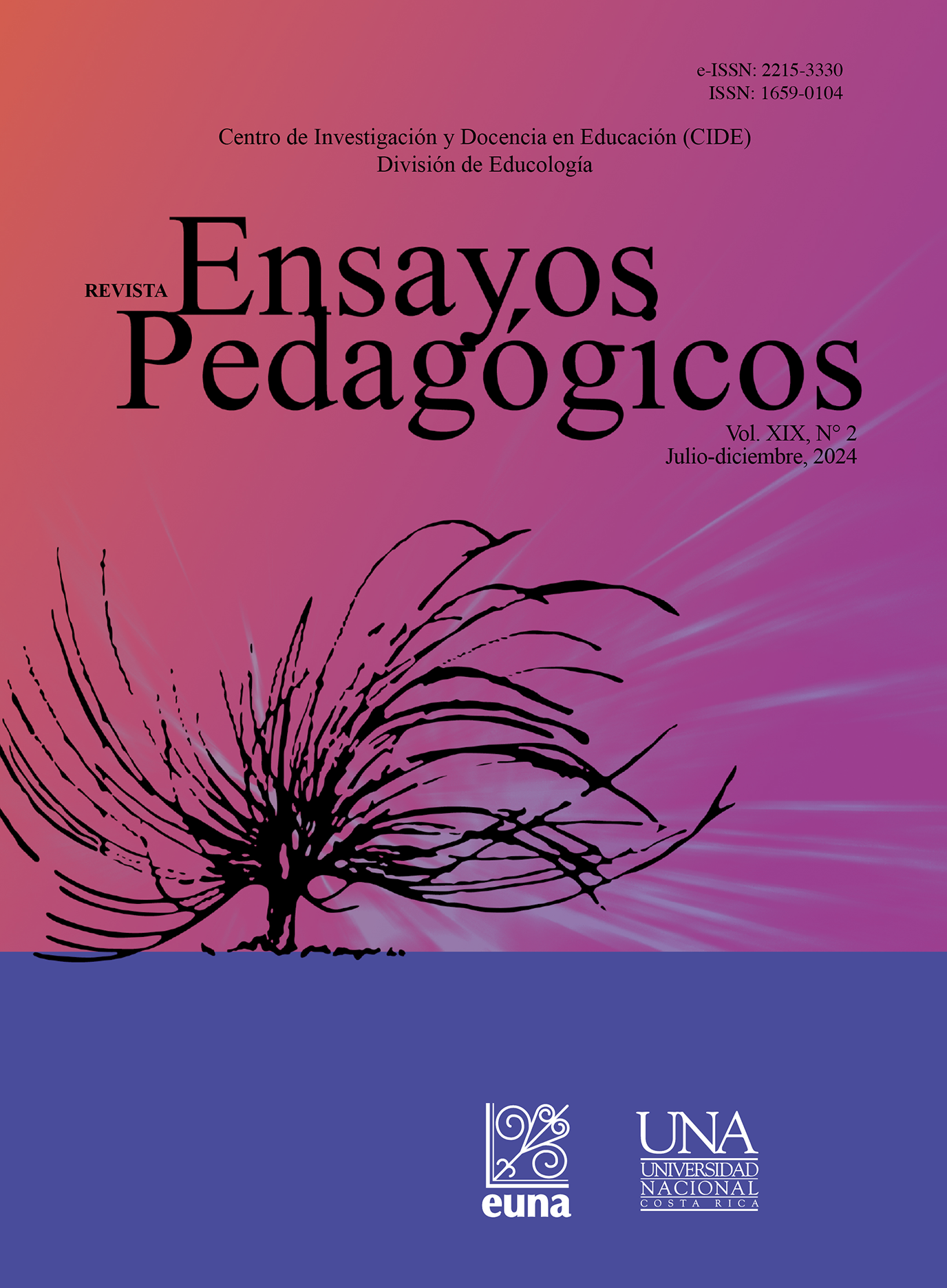Teaching Perspectives in the Era of Artificial Intelligence
DOI:
https://doi.org/10.15359/rep.19-2.6Keywords:
artificial intelligence, education, information and communication technologies, pedagogy, teachingAbstract
The transformation of the teacher’s role in the era of artificial intelligence and information technologies is explored. Some perspectives on the role of education in certain contexts are presented, and briefly, the position of academia in order to find a perspective towards the direction of education in times of artificial intelligence towards the increase in different teaching modalities, such as synchronous and asynchronous ones or the hybrid model (face-to-face and virtual), various ways of understanding contemporary teaching-learning emerge, and it becomes important to generate questions such as How should education be developed in the 21st century?
References
Althusser, L. (1988). Ideología y aparatos ideológicos de Estado (J. Alberto y J. Sazbón, Trads.). Ediciones Nueva Visión. (Trabajo original publicado en 1970).
Calderón, E. R., Guartán, M. A., Troya, I. Y., Manzanillas , C. L. y Moreta, M. E. (2023). La disciplina positiva y su impacto en el rendimiento académico de los estudiantes. Ciencia Latina Internacional, 7(2), 5505-5524. https://doi.org/10.37811/cl_rcm.v7i2.5735
Castillo, G. E., Sailema, J. E., Chalacán, J. B. y Calva, A. (2023). El rol docente como guía y mediador del proceso de enseñanza-aprendizaje. Ciencia Latina Revista Científica Multidisciplinar, 6(6), 13911-13922. https://doi.org/10.37811/cl_rcm.v6i6.4409
Durán, C. M., García, C. L. y Rosado, A. A. (2021). El rol docente y estudiante en la era digital. Revista Boletín Redipe, 10(2), 287-294. https://revista.redipe.org/index.php/1/article/view/1213
Freire, P. (2005). Pedagogía del oprimido (2.ª ed.). Siglo XXI editores.
García, J. J. (2021). Implicancia de la inteligencia artificial en las aulas virtuales para la educación superior. Orbis Tertius – Upal, 5(10), 31-52. https://doi.org/10.59748/ot.v5i10.98
Guevara, E. L., Cedeño, R. C., Escobar, M. E. y Medina, S. R. (2021). El rol docente en la educación virtual. RECIMUNDO, 5(3), 101-107. https://doi.org/10.26820/recimundo/5.(2).julio.2021.100-107
Incio, F. A., Capuñay, D. L., Estela, O. R., Valles, M. A., Vergara, S. E. y Elera, D. G. (2021). Inteligencia artificial en educación una revisión de la literatura en revistas científicas internacionales. Revista de Investigación Apuntes Universitarios, 12(1), 353-372. https://doi.org/10.17162/au.v12i1.974
Llanga-Vargas, E. F., Andrade-Cuadrado, C. E., Guacho-Tixi, M. E., y Guacho-Tixi, M. R. (2021). Dificultades de aprendizaje en modalidad virtual. Polo del Conocimiento, 6(8), 789-804. https://polodelconocimiento.com/ojs/index.php/es/article/view/2979/6498
Miranda-Núñez, Y. R. (2022). Aprendizaje significativo desde la praxis educativa constructivista. Revista Arbitrada Interdisciplinaria Koinonía, 7(13), 79-91. https://doi.org/10.35381/r.k.v7i13.1643
Morales, C. I. e Hidalgo, G. (2023). Distractores de aprendizaje y comunicación en los estudiantes universitarios durante las clases virtuales de la Universidad Juárez Autónoma de Tabasco. International Journal of Humanities and Social Science Invention, 6(12). 1-6. https://www.ijhssi.org/papers/vol12(6)/A12060106.pdf
Ortiz, D. (2015). El constructivismo como teoría y método de enseñanza. Sophia: Colección de Filosofía de la Educación, 19(2), 93-110. https://doi.org/10.17163/soph.n19.2015.04
Otazú, A. M., Goyeneche, J. C., Nunayalle, J. y Franco, D. G. (2023). Percepción acerca de la distracción educativa y los factores del rendimiento en los estudiantes del curso de Ética en la Psicología de la carrera de Psicología [conferencia]. 3 LACCEI International Multiconference on Entrepreneurship, Innovation and Regional Development. Virtual. https://laccei.org/LEIRD2023-VirtualEdition/meta/fp158.html
Shaw, B. (2024). Artificial Intelligence & information literacy. University Libraries, University of Maryland. https://lib.guides.umd.edu/c.php?g=1340355&p=9880565
Nieuwoudt, J. E. (2020). Investigating synchronous and asynchronous class attendance as predictors of academic success in online education. Australasian Journal of Educational Technology, 36(3), 15-25. https://doi.org/10.14742/ajet.5137
Ratan, R., Ucha, C., Lei, Y., Lim, C., Triwibowo, W., Yelon, S., Sheahan, A., Lamb, B., Deni, B. y Hua Chen, H. V. (2022). How do social presence and active learning in synchronous and asynchronous online classes relate to students perceived course gains? Computer & Education, 191(0), 104-621. https://doi.org/10.1016/j.compedu.2022.104621
Neil, S., Rivera-Vargas, P., Passeron, E. y Miño-Puigcercós, R., (2022). ¿Por qué no todo es (ni debe ser) digital? Interrogantes para pensar sobre digitalización, datificación e inteligencia artificial en educación. En P. Rivera-Vargas, R. Miño-Puigcercós, R., y E. Passeron (Coords.), Educar con sentido transformador en la universidad (pp. 137-149). Ediciones Octaedro. https://octaedro.com/wp-content/uploads/2022/02/9788419023674.pdf
Verdugo, P. C. (2004). Educación y política en el siglo XIX. Los modelos laicos-liberal y católico-conservador. Revista Historia de la Educación Colombiana, 6(7), 81-98. https://revistas.udenar.edu.co/index.php/rhec/article/view/1125
Zamora, Z. C. y Stynze, H. O. (2024). Conocimiento, uso y percepción de la inteligencia artificial en la enseñanza superior. Revista Científica Estelí, 13(49), 128-146. https://www.camjol.info/index.php/FAREM/article/view/17889
Downloads
Published
How to Cite
Issue
Section
License
Copyright (c) 2024 Ensayos Pedagógicos Journal

This work is licensed under a Creative Commons Attribution-NonCommercial-NoDerivatives 4.0 International License.
Ensayos Pedagógicos is subscribed to the Attribution-NonCommertial-NoDerivatives 4.0 International Creative Commons Licence, which allows both authors and readers to freely download, store, copy, and distribute the final approved publisehd version of the manuscript (post-print) as long as this is done without commercial purposes, no derivative works are generated, and the source and author are mentioned. As well, Ensayos Pedagógicos declares that authors will remain the rightful owners of the copyrights of their work in perpetuity.







